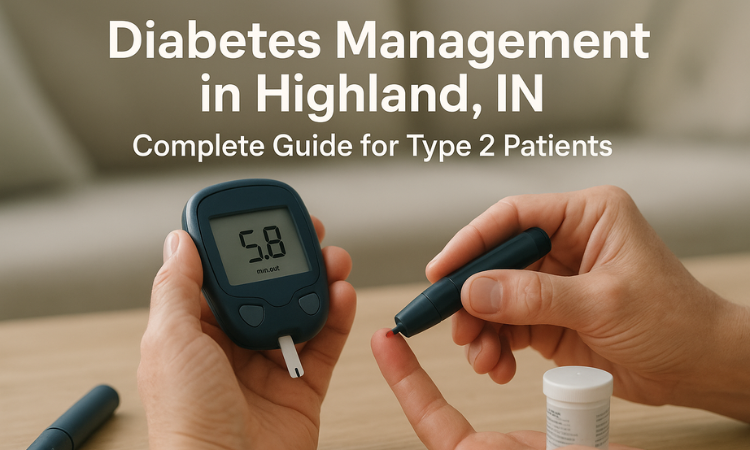Heart disease is one of the leading causes of death worldwide, yet many of its risk factors are preventable. The good news is that adopting healthier habits can significantly reduce your chances of developing cardiovascular conditions. At Munster Primary Care, we emphasize preventive care and patient education to help individuals make informed choices that protect their heart health.
Understanding the Risk
Heart disease develops gradually, often due to the buildup of plaque in the arteries, leading to reduced blood flow. Several factors increase this risk, including high blood pressure, high cholesterol, diabetes, obesity, smoking, stress, and a sedentary lifestyle. While genetics play a role, lifestyle habits have the most significant impact — meaning prevention truly begins with daily choices.
1. Eat a Heart-Healthy Diet
Nutrition is one of the most powerful tools for maintaining cardiovascular health. A diet rich in whole, unprocessed foods helps regulate cholesterol, blood pressure, and blood sugar.
Key recommendations include:
- Incorporate plenty of fruits, vegetables, whole grains, legumes, and nuts.
- Choose lean proteins such as fish, skinless poultry, and plant-based options.
- Replace saturated fats with healthier fats like olive or canola oil.
- Limit sodium, added sugars, and processed foods.
Diets like the Mediterranean and DASH (Dietary Approaches to Stop Hypertension) plans are scientifically proven to lower the risk of heart disease by emphasizing balance and moderation.
2. Stay Physically Active
Regular physical activity strengthens the heart muscle, improves circulation, and helps maintain a healthy weight.
- Aim for at least 150 minutes of moderate exercise per week, such as brisk walking, cycling, or swimming.
- Include strength training twice a week to improve metabolism and muscle tone.
- Avoid long periods of sitting by taking short movement breaks throughout the day.
Even small changes—like taking the stairs instead of the elevator—can make a big difference over time.
3. Maintain a Healthy Weight
Excess body weight, especially around the waist, can increase the risk of high blood pressure, high cholesterol, and diabetes. Achieving a healthy weight through balanced nutrition and regular exercise can improve cardiovascular health dramatically. Losing even 5–10% of body weight can reduce strain on the heart and improve overall well-being.
4. Quit Smoking and Limit Alcohol
Tobacco use is one of the most significant risk factors for heart disease. Smoking damages blood vessels, reduces oxygen in the blood, and raises blood pressure. Quitting smoking is one of the best things you can do for your heart — and the benefits begin almost immediately.
If you drink alcohol, do so in moderation. Excessive drinking can raise blood pressure and contribute to heart rhythm issues. Generally, that means no more than one drink per day for women and two for men.
5. Manage Stress and Prioritize Sleep
Chronic stress can increase blood pressure and lead to unhealthy coping habits such as overeating or smoking. Practicing relaxation techniques like meditation, yoga, or deep breathing helps reduce stress levels.
Sleep is equally vital — aim for 7–8 hours of quality sleep each night. Poor sleep patterns are linked with hypertension, obesity, and heart rhythm irregularities.
6. Monitor Blood Pressure, Cholesterol, and Blood Sugar
Regular health checkups are key to early detection and prevention. High blood pressure and cholesterol often show no symptoms until complications arise. At Munster Primary Care, our medical team provides comprehensive screening and ongoing management for conditions like hypertension, diabetes, and high cholesterol to minimize long-term cardiovascular risks.
7. Limit Salt Intake
High sodium intake contributes to hypertension, one of the most common causes of heart disease. Reducing salt when cooking, reading nutrition labels carefully, and choosing fresh foods over processed ones can help maintain optimal blood pressure levels.

A Preventive Approach to Heart Health
Heart disease prevention is not about making dramatic changes overnight — it’s about consistent, sustainable habits. Each positive step, no matter how small, contributes to long-term heart health.
At Munster Primary Care, we believe that prevention is the foundation of good health. Our physicians work closely with patients to develop personalized wellness plans, combining medical expertise with lifestyle guidance to help you achieve lasting results.
Take Charge of Your Heart Health
Your heart deserves daily care and attention. Eat well, stay active, manage stress, and schedule regular checkups. Small, consistent actions today can help you live a longer, healthier life tomorrow.
If you’re ready to take proactive steps toward better heart health, schedule an appointment with Munster Primary Care. Our compassionate team is here to guide you through every stage of your wellness journey.








